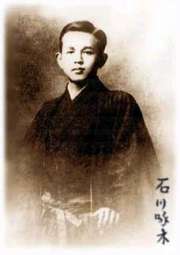|
Biografii Ishikawa Takuboku
Takuboku Ishikawa - un poet din era Meiji. Și-a început cariera ca romantic și a scris spre sfârșitul vieții poezii ce aveau ca subiect probleme sociale.
Takuboku a fost considerat unul dintre cei mai buni poeți de tanka ai vremii și unul dintre importanții precursori ai poeziei moderne.
Takuboku Ishikawa (石川 啄木 ,Ishikawa Takuboku?, February 20, 1886–April 13, 1912) was a Japanese poet. He died of tuberculosis on April 13, 1912. Well known as both a tanka and \'modern-style\' (shintaishi or simply shi) or \'free-style\' (jiyūshi) poet, he began as a member of the Myōjō group of naturalist poets but later joined the \"socialistic\" group of Japanese poets and renounced naturalism.
Major Works His major works were two volumes of tanka poems plus his diaries:
* Ichiakuno suna (A Handful of Sand) 1910
* Kanashiki gangu (Sad Toys) published posthumously in 1912
Timeline
Ishikawa Takuboku, ca. 1900
* 1886 - Born at Joko Temple, Hinoto-mura (presently named Hinoto, Tamayama-mura), Minami-Iwate-gun, Iwate Prefecture, to Ittei, the father, who was the priest of the temple, and Katsu, the mother.
* 1887 - Moved to Shibutami-mura (presently named Shibutami, Tamayama-mura)
* 1891 - Attended Shibutami Elementary School (4 years)
* 1895 - Attended Morioka Upper Elementary School (2 years)
* 1898 - Attended Morioka Middle School
* 1899 - Published literary booklet “Choji-kai”, printed by hand with method called hectograph
* 1900 - Formed self-study group “Union Club” in order to learn English. First and second issues of “Choji Magazine” were published. Fell in love with Setsuko Horiai who was a student at Morioka Girls’ Middle School.
* 1901 - Published the third issue of “Mikazuki” (crescent moon), a magazine for circulating, and the first issue of “Nigitama.” His tankas appeared on Iwate Nippo (news paper) under the pen name of “Suiko”, the first public appearance of his works.
* 1902 - His tankas appeared on “Myōjō”, a literary magazine, under the penname of “Hakuhin”. Dropped out of Morioka Middle School because of his aspiration for literature. Went to Tokyo and made the acquaintances of Tekkan and Akiko Yosano.
* 1903 - Went home to Shibutami. Serial articles “Ideas of Wagner” appeared on Iwate Nippo. Poem ”Shucho” (sorrowful melodies) was appeared on “Myōjō”. The pen name of “Takuboku” was used for the first time. In November, joined the circle of poets “Shinshisha”.
* 1904 - Serial articles “Senun Yoroku” (personal memorandum of war time) appeared on Iwate Nippo. This was right after the outbreak of Russo-Japanese War.
* 1905 - The first collection of poems “Akogare” (admiration) was published by Odajima Shobo. Got married to HORIAI Setsuko. Published literary magazine “Sho-Tenchi” (small world).
* 1906 - Became a substitute teacher at Shibutami Upper Elementary School. Novel “Kumo wa Tensai dearu” (the clouds are geniuses) was written, which was never published during his lifetime. Novel “Soretsu” (funeral procession) appeared on literary magazine “Myōjō” (December issue of 1906).
* 1907 - Became a substitute teacher at Hakodate Yayoi Elementary School, and a freelance reporter at Hokodate Nichinichi Shinbun (news paper). Because of the great fire in Hakodate, he lost both jobs and left Hakodate. Employed at places like Hokumon Shinpo or Otaru Nippo (publishers of news paper)
* 1908 - Employed at Kushiro Shinbun (news paper), wrote “Benifude-dayori”. Moved to Hongo, Tokyo in spring.
* 1909 - Employed at Asahi Shinbun as a proof reader. Issued literary magazine “Subaru” as a publisher.
* 1910 - First collection of tankas “Ichiaku-no-Suna” (a fistful of sand) was published by Shinonome-do Shoten.
* 1911 - Moved to Koishikawa because of health reasons.
* 1912 - In March, his mother Katsu died. He himself died of tuberculosis on April 13, being looked after by his friend Bokusui Wakayama and his wife Setsuko, at age of twenty seven. After his death, his second collection of tankas “Kanashiki Gangu” (grieving toys) was published by Shinonome-do Shoten.
* 1926 - In August, his grave was erected by both Miyazaki Ikuu, his brother-in-law, who was also a poet, and Okada Kenzo, the chief of Hakodate Library.
* 1988 - The main-belt asteroid 4672 Takuboku (1988 HB) is named in his honor.
|





